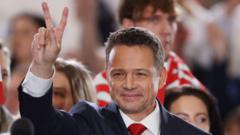Rafal Trzaskowski, the liberal mayor of Warsaw, has claimed a narrow victory in Poland's presidential election, but he will face his conservative opponent, Karol Nawrocki, in a necessary second-round run-off. With neither candidate securing the required majority, the upcoming election highlights a politically divided Poland with significant implications for the ruling coalition.
Trzaskowski Leads in Polish Presidential Election, Set for Tight Run-Off

Trzaskowski Leads in Polish Presidential Election, Set for Tight Run-Off
Warsaw's liberal mayor narrowly secures first place, but a second round is necessary against conservative rival Ohkarol Nawrocki.
In a closely watched election, Warsaw's liberal mayor, Rafal Trzaskowski, emerged with a slim lead, earning 31.3% of the vote according to early exit polls. However, his conservative rival, historian Karol Nawrocki, garnered a strong 29.5%, setting the stage for a run-off election on June 1 as neither candidate surpassed the 50% mark to secure an outright win.
With voter turnout reported at over 67%, Trzaskowski, who is also a deputy leader of Prime Minister Donald Tusk's centrist Civic Platform (PO) party, expressed confidence at a rally in Sandomierz, stating, "We're going to win," while acknowledging the challenges that lie ahead. He outlined plans to collaborate with Tusk's coalition to liberalize Poland's strict abortion laws and pursue judicial reforms to counteract the perceived politicization by the previous government led by PiS.
Despite initial predictions placing Trzaskowski 4%-6% ahead of Nawrocki, the former's performance fell short of expectations. Poland's presidential power is predominantly ceremonial, but the president retains veto rights over legislation, creating a strategic hurdle for Tusk's coalition, which currently lacks a parliamentary majority.
Nawrocki, backed by the conservative Law and Justice party (PiS), indicated a robust campaign, urging voters to unite against Tusk's potential "total power." Key to the second-round election will be which candidate can effectively mobilize their supporters. While Trzaskowski will need to appeal to centrist voters and those from junior coalition partners, Nawrocki aims to attract supporters from far-right candidates who performed unexpectedly well in the first round.
The far-right reform party's candidate, Slawomir Mentzen, finished third with 14.8%, while Grzegorz Braun secured 6.3%. Mentzen, appealing particularly to youth voters, may pose a challenge for Trzaskowski if his supporters decide to abstain or lean towards Nawrocki's candidacy due to shared social conservatism.
The political landscape of Poland remains fraught with tension, as shifting allegiances among voters could determine the outcome of the crucial run-off, echoing broader themes of division within Polish society.




















